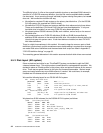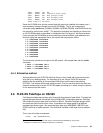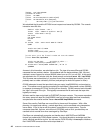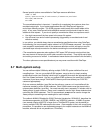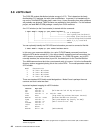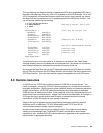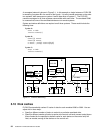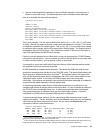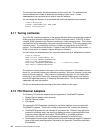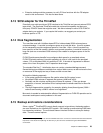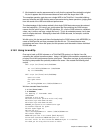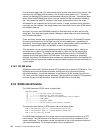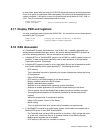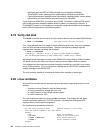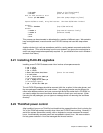52 S/390 PID: ThinkPad Enabled for S/390
The command can specify any device address on the control unit. The dedicated lines
column indicates the number of dedicated (non-floating) cache tracks. A clear
ckdcachestats cuu command can be used to reset the statistics.
You can display the definition of an emulated disk with the d devstate cuu command:
flexes> d devstate A87
Filename: /s390/OS39HA State: OPEN, READY
Options: trackcachesize=30
5.11 Tuning cachesize
The FLEX-ES cachesize parameter (in the system definition section) specifies the number of
S/390 bytes that should be reflected in the FLEX-ES instruction cache. FLEX-ES, in effect,
compiles S/390 instructions into Pentium instructions in order to execute them. This involves
overhead that can be reduced by saving the compiled instructions. This is the purpose of the
instruction cache. The underlying structure is complex and proprietary to the FLEX-ES
product. The instruction cache requires 11 bytes for each S/390 instruction byte cached. A
S/390 LA instruction, for example, requires 44 bytes in the cache.
You can monitor the effectiveness of the instruction cache with the d cachestats command:
flexes> d cachestats
Cache hits (m1): 1234567/6543321 55%
Cache hits (fb): 66554433/3344556678 20%
Cache hits (fbt): 98744/4567890 33%
Cache misses: 5023567432/103543345876 5% <== monitor this number
Cache compiles: 2345245/34567346 80%
....
The number of cache misses in this report is the critical information. If this number is above
about 4%, you should increase your cachesize parameter. (But never increase it to the point
where Linux starts paging!) If the number is considerably less than 4%, you might make
better use of your Server memory by increasing the defined S/390 memory size, defining
more S/390 expanded memory, or increasing disk cache sizes. The CLI command clear
cachestats will reset the statistics.
FSI has not documented the meanings of the other statistics in this report.
5.12 FSI Channel Adapters
The following FSI hardware adapters are not supported for ThinkPad/EFS systems:
Parallel Channel Adapter (both versions)
ESCON Channel Adapter
ICA Adapter
The required FLEX-ES packages (modules) to use these adapters are not provided with
ThinkPad/EFS systems. There are a number of reasons for this, including the following:
ThinkPad/EFS systems are not intended for production use. Different users will define
production in different ways, and we will not attempt to make a rigorous definition here.
Supporting these adapters could place ThinkPad/EFS in a potential production
environment, and this has too many exposures (especially in the RAS area).
These adapters would require docking stations that could accept full-length PCI adapters.
None of the current docking stations intended for the supported ThinkPad models have
this capability.



